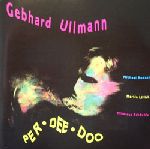Home » Jazz Articles » Album Review » Gebhard Ullmann: Per Dee Doo
Gebhard Ullmann: Per Dee Doo
The tunes chosen will be familiar to most listeners and come from many different eras. What might give pause is the treatment the tunes are given, many of which are considered iconic. The energy level is very high and the band should be congratulated rather than castigated for playing what they feel rather than paying obeisance to some ossified past.
Bassist Martin Lillich and drummer Nikolaus Schäuble return from Ullmann - Rava - Willers - Lillich - Schauble (Nabel, 1989), with guitarist Michael Rodach replacing longtime partner Andreas Willers. Why Rodach has replaced Willers is not known, but one possibility is that Ullmann wanted him precisely for the kind of overdrive in his playing that he does naturally .
Exploding as the first track is "Seven Come Eleven," a very tight, riff-based tune from clarinetist/bandleader Benny Goodman and guitarist Charlie Christian. Ullmann and the band play the melody very fast in unison, showing chops in the old style. Rodach then goes off into fusion land, turning the tune inside out, but Ullmann answers with an extremely outside, driving soprano sax solo, but in the original walking bass meter—fantastic.
"Perdido," the Juan Tizol tune that was made famous by Flip Phillips during the Jazz At Lincoln Center concerts in the forties, is treated very roughly with a funky back-beat that clashes with the straight theme. The effect is almost humorous and the question is, "Why not?"
The band switches gears entirely, or so it seems, with Sonny Rollins's charming "St. Thomas." Ullmann plays the tune sweetly on soprano only to be answered by an effects attack from Rodach, after which Ullmann responds with an outside, but melodically recognizable solo. The return to the original tune actually sounds quaint and again humorous.
Carla Bley's simple and touching "Ida Lupino" is played on the straight side, with some overdubbing by Ullmann on soprano commenting over the melody played by his tenor. The effects Rodach uses gives the track a feeling of a rock ballad, which actually does work.
The second half of Per-Dee-Doo starts with a radically deconstructed version of Ellington's "Satin Doll." Initially, the back beat and free, microtonal playing sounds irreverent, but as it progresses, you can almost see Duke smiling and getting into it.
Ending the set is Hoagy Carmichael's "Georgia On My Mind" and is the strangest choice, but heck, we have come this far, so hang with Ullmann and get inside his head as he departs from the familiar, rather than playing originals.
Track Listing
Seven Comes Eleven; Perdido; 502 Blues; St. Thomas; Ida Lupino; Satin Doll; Epistrophy; Fall; Blue In Green; Georgia On My Mind.
Personnel
Gebhard Ullmann
saxophoneGebhard Ullmann: tenor and soprano saxophones, bass flute; Michael Rodach: guitars; Martin Lillich: bass; Nikloas Schauble: drums.
Album information
Title: Per Dee Doo | Year Released: 2007 | Record Label: Nabel
< Previous
More Jazz
Next >
Tolminski Punt
Comments
About Gebhard Ullmann
Instrument: Saxophone
Related Articles | Concerts | Albums | Photos | Similar ToTags
Concerts
For the Love of Jazz
 All About Jazz has been a pillar of jazz since 1995, championing it as an art form and, more importantly, supporting the musicians who create it. Our enduring commitment has made "AAJ" one of the most culturally important websites of its kind, read by hundreds of thousands of fans, musicians and industry figures every month.
All About Jazz has been a pillar of jazz since 1995, championing it as an art form and, more importantly, supporting the musicians who create it. Our enduring commitment has made "AAJ" one of the most culturally important websites of its kind, read by hundreds of thousands of fans, musicians and industry figures every month.




















